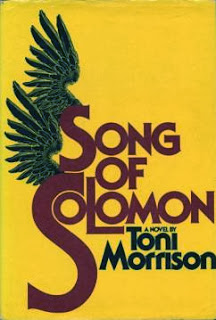I opt to
work only on the second and third level of inquiries for Song of Solomon; which
I wrap up in this one post.
Logic-Stage Inquiry
What does Milkman
want? What is standing in his way? And what strategy does he pursue in order to
overcome this block?
Milkman
wants freedom; freedom to lead his
own life, not the life the society forces him to take. Even before he was born,
it is as if his fate has been scratched into his book of life. After he’s grown
up, everyone seems to want his life, own
him, need him, and won’t let him alone (his father, his mother, his
girlfriend, even Guitar). To overcome the block, Milkman knows he needs to leave his past, stays away
from his families and all their histories. So, when his father asks him to find
the gold, he leaves eagerly to the South. It’s not merely about the gold—although
he believes it is at first—but more about the freedom, to do something his own
way, to decide things by himself, to take control of his life.
Beginnings and
endings
I believe this
is one of Toni Morrison’s strengths: how she arranges her writings in a neat
and tidy package. The novel begins with a
‘fly’ and ends also with a ‘fly’. The first fly—the insurance agent’s leap
from the hospital roof—feels strange, and I didn’t know what it means until I
reach the ending. And only when Milkman leaps towards Guitar, did I realize
what all the leaps in this novel meant.
Images and metaphors
Being a
magical realism, of course there are a lot of metaphors here. I only discuss
one of them: the leap or the flying. People
in this book do not think it strange for men to fly. So, it must have represented
something real. After finishing the book, I think ‘flying’ here means flying
from your helpless situation to a new brighter future. Milkman is so happy when
he learns that Solomon—his great grandfather—can fly, and he thinks, if his
great grandfather can fly, so can he. I think the flying for black people here
represents the escaping from the whites’ domination and injustice.
Rhetoric-Stage
Inquiry
Do you sympathize
with the characters? Which ones, and why?
I thought
more about Milkman and Guitar than the
other characters in this novel. They both want to fly from their present
conditions, although by leading different paths. They both would have led a
great future if they were born as white men. Even Milkman, with a comfortable
living, still feels oppressed by the racial colonialism; let alone
Guitar, who have neither freedom nor money. His choice is wrong—killing innocent
people is wrong—but it’s only to highlight how he feels so helpless; that there
is no way out other than savage killings. And they—Milkman and Guitar—must go
through that just because they are born black.
What does the setting
of the book tell you about the way human beings are shaped?
It tells me that
colonialism would only bring moral
corruption to the oppressed. When you treat others inhumanly, they would
grow savage, because men are created to be free. And after some generations, it
would shape their whole race or nation’s mental. It is not that certain race is
worse than the others; look at Milkman and Guitar; if they were born white,
things would have been different. Milkman would not be that indifferent, while
Guitar would perhaps not be a savage killer. They do not want to be that way,
but they are forced to survive in the crushed world they live in. And all that is
because they are black.
What exactly is the
writer telling you?
Morrison wants
us to witness the ugly truth of whites’
colonization towards the blacks. She wants to show us what really happened
inside the society. Most of them were perhaps just living it bitterly, but some
of them show us that they too have dignity; dignity to force them to leave
their families, or, like Guitar, to be a savage killer. And all these mess were
caused by the racial colonization. They do not want to be that way, but they
were helpless. She also tells us not to live submissively under the colonialism, she tells us to fly or leap to a brighter future.
In what sense is the
book true?
It’s true that
men tend to feel superior against others who are different from them, and I
believe racial colonialism is still happening even today.
~~~~~~~


No comments:
Post a Comment
What do you think?